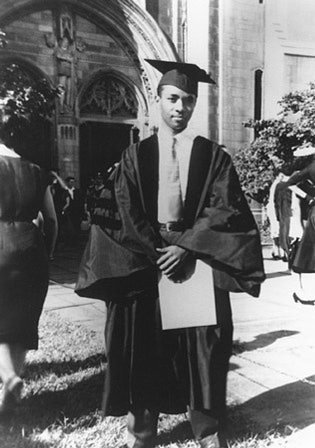 Darwin Turner, who was one of the first directors of the University of Iowa’s African-American studies program, helped give the field credibility.
Darwin Turner, who was one of the first directors of the University of Iowa’s African-American studies program, helped give the field credibility.As a graduate English student at a Michigan university more than 40 years ago, Melba Joyce Boyd sat in on a seminar that featured a speaker who has had a profound impact on her career.
The speaker was a highly regarded African-American professor of English from the University of Michigan by the name of Darwin Turner, and his topic was Black drama. Black professors on predominantly White university campuses were rare then. Rarer still was an acknowledgment of African-American studies as worthy of scholarship.
“A professor of mine told me that in a meeting with the department chair and the university president, the department head had said he didn’t think Black American literature was a legitimate genre and he wouldn’t recognize it,” says Boyd, now a distinguished professor and chair of Africana studies at Wayne State University in Detroit. “He was overruled by the president, so he had to offer it. [But] that’s the level of resistance that was coming from the power structure. It made it very difficult for me. And in the throes of this, Darwin shows up.”
Perhaps as much as anyone, Turner, who was one of the first directors of the University of Iowa’s African-American studies program, helped give the field credibility in the academy both nationally and internationally. Turner, who died in 1991, was a prolific writer and scholar who went on to hire and mentor young scholars in African-American studies.
“He laid the foundation,” says Boyd. “He created opportunities for people like myself to be hired to teach what we wanted to teach, not what others wanted us to teach. These programs gave us the time and space to do scholarship in that area. People like Darwin helped to solidify the curriculum as a legitimate and acceptable part of the canon.”
Adds Dr. Horace Porter, chair of African-American Studies at the University of Iowa:
“Professor Darwin Turner was a singular figure in the establishment of African-American studies as we know it today. He was also a remarkable scholar of African-American literature.”
Turner arrived on the scene during a revolutionary time in the academy. For the first time, an increasing number of predominantly White universities were admitting African-Americans in significant numbers, and faculty members of color were slowly becoming a familiar presence on campuses. But subjects like African-American literature and history were largely ignored in the classroom. And most professors with research interests in African-American literature or history had to find other interests in order to earn tenure or promotion.
“He was not just an expert on Black literature, but on everything,” says Boyd. “He was an expert on Shakespeare. That’s the way that generation was. They had to be super-people, and they had to be perfect. He was also writing on Black literature and documenting it at a time when it was outside the mainstream.”
As African-American studies gained traction as a legitimate scholarly endeavor in the 1970s, scholars like Turner were encouraged to develop programs and showcase their work at conferences. They also worked closely with younger scholars and encouraged them to pursue African-American studies as their research interests. But even with this growing acceptance in the academy, African-American studies scholars faced a bumpy road, and Turner gets a lot of the credit for paving this road, says Boyd.
“He was one of the persons that also created that bridge that allowed African-American studies to enter into the general academy,” she says.
Several leading African-American studies scholars credit Turner with inspiring them and helping build their careers. Dr. Houston Baker, a distinguished university professor of English at Vanderbilt, recalls that Turner served as an outside reader when he wrote his first book in the late 1960s.
“He gave it a very favorable review,” says Baker, who was then a professor at the University of Virginia. “When I did meet him, we talked about the book. He said ‘This is an elegant book, and you’re off to a good start.’”
Such praise of his work from Turner, he says, was a very important endorsement to him.
“When I met Darwin Turner, he was, in my mind, one of the shining examples of that generation who, against the odds, went on and established the African-American studies program,” he continues. “Shaking hands with Darwin Turner as someone who approved my work was like having a whole generation approving my work. It’s moments like that that move us forward and also keep us true to the legacy that has been passed on.”


















